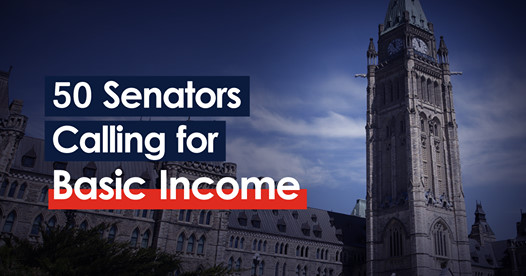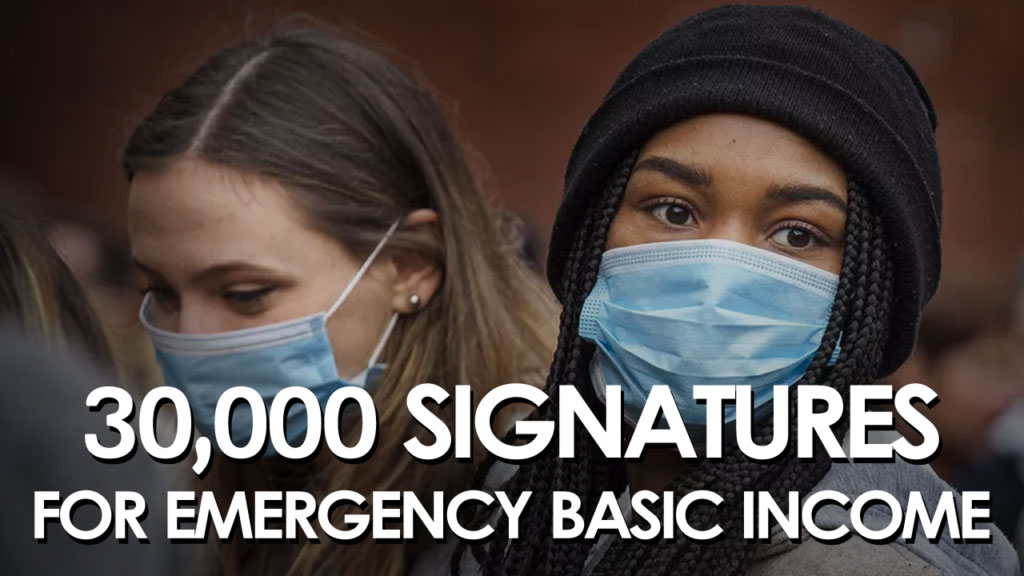
NEWS RELEASE
Open Letter from Senators to Prime Minister, Deputy PM and Finance Minister
Calls for Minimum Basic Income
FOR IMMEDIATE RELEASE
OTTAWA, TUESDAY, APRIL 21, 2020—Today 50 members of the Senate of Canada from across affiliations and regions wrote to the Prime Minister, Deputy Prime Minister and Finance Minister commending them for the government’s actions to date and calling for further evolution of the Canada Emergency Response Benefit (CERB) in order to implement a minimum basic income.
Since introducing the CERB in response to the COVID-19 pandemic, the government has continued to evolve this program to provide income support of $500 per week to more Canadians in need. Senators have heard from Canadians that further positive developments to the CERB are needed in order to stop other groups of Canadians from falling through the cracks.
Restructuring the CERB as a minimum basic income would quickly get support to Canadians in dire straits who need assistance now. Doing so would also free up valuable time and resources needed to craft and implement further changes to the CERB and to renew eligibility of individuals for the CERB in the next months and beyond.
Each new fix to the CERB, while welcome, means delays in getting help to those who need it most. As a matter both of social equity and efficiency, Senators are joining the calls of Canadians across the country to ensure that, in this time of need, no one falls through the cracks and everyone has their place on “Team Canada”.
For more information:
Emily Grant
Office of Senator Kim Pate
emily.grant@sen.parl.gc.ca
Tel: 613-355-6574
Jeanne Provencher
Office of Senator Frances Lankin
jeanne.provencher@sen.parl.gc.ca
Tel: 343-549-2274
THE SENATORS’ LETTER
April 21, 2020
The Right Honourable Justin Trudeau, P.C., M.P.Prime Minister of Canada
Office of the Prime Minister
80 Wellington Street
Ottawa, ON KIA 0A2
The Honourable Chrystia Freeland, P.C., M.P.
Deputy Prime MinisterPrivy Council OfficeRoom 1000
85 Sparks StreetOttawa, ON KIA 0A3
The Honourable Bill Morneau, P.C., M.P.Minister of Finance
90 Elgin Street, 17th Floor
Ottawa, ON KIA 0G5
Dear Prime Minister, Deputy Prime Minister and Minister Morneau:Subject: COVID-19 Pandemic - Minimum Basic Income
—
This is a unique moment in our history - a moment when Canadiansfrom across the political and economic spectrum have seen before them the value of a programwhich would not require
complicated application and qualification processes, but whichwould be there for people in times of need. As members of the Senate of Canada, we are writing to youto thank you and urge a further evolution of the Canada Emergency Response Benefit(CERB).
Firstly, we want to express our genuine thanks and appreciation toCanadian Governments — Federal, Provincial, Territorial andMunicipal, as well as opposition parties for all collaborative efforts to date.
In these extraordinary times, the “Team Canada” approach beingdemonstrated by public service officials at all levels is both heartening and encouraging, particularlyin the continually evolving development of needs-based crisis policy responses. For this and the climate of hope and optimism
during this pandemic, we thank you.
As you have noted, governmental responses continue to evolve. Weare writing to address an opportunity for further positive development with respect to theCERB.
Based upon what we are all hearing from Canadians, we believe it isvery clear there will continue to be a need to create additional patches to the CERB to stop othergroups of Canadians from falling through the cracks. Further administrative work will also berequired to renew eligibility of individuals in the next months and beyond.
Moving forward, we encourage you to finish the work you havecommenced by restructuring the CERB to ensure greater social and economic equity as well asgreater efficiency.
Using the tax rolls to send a crisis minimum income to all who are inneed would accomplish these two key goals. In terms of efficiency, as we are already seeing, it canquickly get support to canadians who are in dire straits. CRA can issue these payments bydeposit or mail with little more than the push of a button. People in need require support today. Interms of social and economic equity, it would allow for a more expeditious application of thebenefit to those vulnerable Canadians for whom support will otherwise be required. Each newinitiative takes time to craft and time to implement, leaving those most vulnerable to experiencechronic hardship.
The use of the CRA tax rolls could also free up public servicecapacity that is currently stretched as public servants strive to administer applications, assess and, witheach new measure, reassess eligibility and processing payments. The liberated time andresources could be utilized to help people not currently on the tax rolls to convert their applications totax files. Such measures could ensure quick payment for individual Canadians while simultaneously increasing the ease of administration and sustainability of supports that we can alreadyrecognize will be needed beyond the current timeline for the program, and into the foreseeable future.
Increasing public service capacity will enable officials to respondmore quickly and efficiently by freeing up their time to identify and address the needs of thoseindividuals and groups who might still fall through the cracks.
Ministers, we know you recognize that the layering of each fix to theCERB, while vital and welcome, means delays in getting the most needed help to thepeople who are already most vulnerable to economic and therefore health insecurity.
In the short term, our focus must be on ensuring the CERB isavailable for all who need it. When this immediate emergency has abated, we urge you to work withParliamentarians and others to use the lessons from the CERBexperience and the entire COVID-19 crisis to craft social andeconomic reforms and develop a positive legacy for all Canadians.
We are in touch with many Canadian individuals and organizationswho support this approach and are encouraging us to convey to you the urgent need for these typesof measures.
We are keen to support and assist you to take steps in order toensure that all people are included and have their place on “Team Canada”. Thank you once again andwe wish you and all Canadians all the best as we work together to stay safe and well.
Sincerely,
The Honourable Frances Lankin and Kim Pate, Senators, with andon behalf of:
The Honourable Margaret Dawn Anderson, Senator

On March 16, 2020, UBI Works launched a petition calling for an emergency UBI in response to theCOVID-19 crisis. The petition garnered over 30,000signatures across all 338 federal ridings, with each signer emailing their Member of Parliament to call for a UBI.
The Government of Canada responded by announcingthe Canada Emergency Response Benefit (CERB), ashort-term basic income for Canadians who lostincome due to COVID-19, in addition to a one-time GSTcredit of $400 per individual ($600 per couple) for low-and moderate-income Canadians, as well as a $300boost to the Canada Child Benefit basic income.
This pandemic showed us that Canadians need aUniversal Basic Income.
We are aware that these measures, while they help many Canadians, still leave many others out. From day one, the CERB left out more than 850,000Canadians, 1/3 of the unemployed, who had no income support from either EI or the CERB. The government expanded the eligibility criteria after weeks of constant pressure from Canadians to move towards a universal basic income. This pandemic has shown us that Canadians are not resilient enough in a time of crisis. Many of us who lost work from this crisis may find ourselves not hired back, or going back to lower paying work. An estimated 15% of the over 15 million workingCanadians—more than 2 million Canadians in total—will soon find themselves without work. Yet, research shows that 42% of the Canadian workforce is at high risk of being automated away—using existing technology—over the next 10-20 years. If we already had a universal basic income, noCanadian would have fallen through the cracks during this crisis. Millions of Canadians would not have needed to wait weeks, perhaps months, before getting the help they needed.
Join our mailing list and stay up-to-date on how we are working to make Universal BasicIncome a reality in Canada.